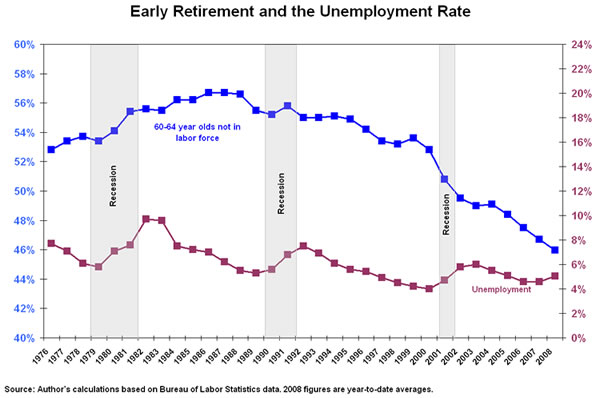See Snapshots archive.
Snapshot for June 25, 2008.
How economic conditions affect retirement decisions
Younger workers struggling to find a job now have something else to worry about: older workers with little choice but to keep working, even in a weak labor market.
The decades-long postwar trend toward earlier retirement reversed itself in the 1990s, as fewer workers found themselves covered by traditional defined-benefit pensions or had access to retiree health care benefits.
In the past, cyclical downturns in the economy prompted an increase in early retirements. As the chart shows, increases in the unemployment rate during the recessions of the early 1980s and 1990-91 were associated with upticks in the share of 60-64 year olds not in the labor force. Thus, retirees made way for younger workers entering the labor force when jobs were scarce.

But with 401(k)s replacing traditional pensions, early retirement may no longer be tied to labor market weakness. Instead, retirement decisions appear to be increasingly affected by gyrations in the housing and stock markets. Take, for example, this clear break from precedent—the uptick in early retirement during the late 1990s, a period when labor markets were actually very tight, but the stock market was booming. Early retirements subsequently declined after the stock market bubble burst and ushered in the 2001 recession.
This new trend toward later retirement is unlikely to reverse any time soon, as a recent survey showed a sharp drop in the share of workers confident they would be able to afford retirement, due to concerns about health care costs, the weakening economy, and declining home values.1
To learn more about how retirement and the economy are linked, please join the Economic Policy Institute on Tuesday, July 1st, for a book discussion and signing with Teresa Ghilarducci, author of When I’m Sixty-Four: The Plot against Pensions and the Plan to Save Them. Click here to learn more and reserve a seat.
Notes
1. Ruth Helman, Jack VanDerhei and Craig Copeland, “The 2008 Retirement Confidence Survey: Americans Much More Worried About Retirement, Health Costs a Big Concern,” Employee Benefit Research Institute Issue Brief #316, April 2008.
